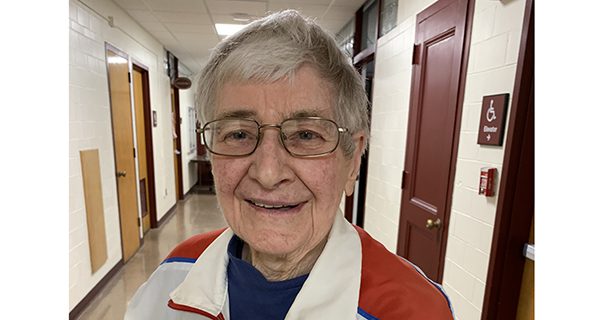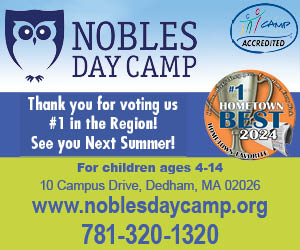By Linda Thomas
Hometown Weekly Correspondent
It was at the brink of the Great Depression, and there were no organized leagues or manicured ballfields when Natalie McComb was growing up in East Walpole.
She and the neighborhood kids created their own teams and played in places like the playground at Francis William Bird Park — or just on the street. No uniforms, often no gloves and lots of rocks. Fielding ground balls was an invitation to dental repair.
Real baseballs were costly, therefore rare. If you loved sports, you played.
And McComb played.
“We didn’t have much,” she said. “Our motto was: ‘Use it up, make it do or do without.’
“Nothing was commercialized then. You’d get a bat if you could get one. If not, you got a broom stick and whatever kind of ball you could get. When we played tag football … we’d get a sugar cloth bag, stuffed it with leaves and use that for a football.”
It was a no-nonsense approach she carried with her throughout her life teaching physical education and coaching.
“The Early Years”
McComb was born Natalie Kemp in Exeter, New Hampshire to Ralph and Mildred Kemp. She was a few weeks old when the family moved to East Walpole after her father found work at Bird & Son, Inc. Two and a half years later, her brother, Malcolm, was born.
Even before the 1930s, a turning point for female athletes, McComb paid no attention to heightened opportunities for women in sports. She simply enjoyed playing.
At 9, her father taught her to play tennis, as well as the basics of softball and catching the ball. In high school, she played field hockey — the only sport available for girls at that time.
At 16, she played on the softball team for Bird & Son’s industrial league. During summers, she worked as a lifeguard and swim instructor at the former Bird Park Swimming Pool.
McComb graduated from Walpole High School in 1943. From there, she went on to the University of New Hampshire, majoring in physical education, health and recreation with a minor in English. During her college summers, she worked as a playground instructor for the town of Walpole.
She earned a master’s degree in guidance from then-Bridgewater College, now named Bridgewater State University. She spent the next three years teaching in Vermont, then a year in Deerfield, Massachusetts.
On Sept. 8, 1951, she married her high school classmate and “love of my life,” Hugh McComb. She spent the first three years of their marriage as a homemaker before returning to the classroom.
In the middle of the school year 1954, she was hired to teach a biology class at Foxboro High School. Soon thereafter, the full-time physical education teacher left, opening the door for McComb, who was also offered to coach girls’ field hockey, softball and basketball teams, and later the girls’ tennis team.
McComb enjoyed playing softball in college. But she enjoyed coaching field hockey.
Sometimes in the mid 1950s, she took up golf. She joined the old Walpole Country Club and eventually won the women’s club championship. Several years later, looking for another challenge, she joined the Foxboro Country Club, where she, again, won the women’s club championship.
“Coachie”
During her 32-year tenure at Foxboro High School, McComb practiced respectful discipline.
“I always said my kids were good because the parents were good,” she said. “I never sent a kid to the principal’s office. If a student did something wrong or misbehaved, I told them, ‘I’ll see you at 2:00 o’clock in my office,’ and we talked for a few minutes, shook hands and everything was over.”
She made a definite impact.
Dottie Potter Zenaty took full advantage of the interscholastic sports that were offered to girls at Foxboro High School. She began competing in field hockey, basketball and softball as a seventh-grader, and continued through her senior year of high school in 1961.
“Nat McComb was an outstanding teacher and coach,” Zenaty said. “She had the knowledge and ability to challenge each athlete to perform at their highest level.”
Zenaty said she learned so much from McComb’s professional outlook on sports and her positive mentoring that Zenaty herself became a physical educator and coach at the high school and college level.
“Thank you, Nat, for all that you taught me and for believing in me all those many years ago,” said Zenaty, who describes McComb as the “epitome of professionalism” throughout her career at Foxboro — who certainly made a difference in the lives of hundreds of young girls.
Zenaty notes McComb still attends high school reunions and everyone looks forward to connecting with her again after all the years she gave of herself to the Foxboro sports programs.
“Can’t say enough about Coachie, an endearing nickname given to her by all the athletes she coached,” said Doris Huxtable Daniels, class of 1963.
“She had such a strong presence when we played sports. She always seemed to know what needed to be done to win and was able to get the best from the players. We wanted to live up to her expectations and tried to play the best game we could.
“She was an excellent motivator, encouraging us when we did well, and pointing out what went wrong when we didn’t.
“She coached our teams to a winning record in my senior year of high school. We were undefeated in all three girls’ sports. We were the Hockomock champions in field hockey, softball and basketball.
“Girls’ sports always seemed to take a back seat to the boys’ sports, but Coachie led by example and put girls’ sports on top by having winning teams — and she earned respect.”
Daniels remembers McComb’s words: “Play your position, keep your sticks down, run faster, keep your eye on the ball … get to bed earlier the night before an important game.”
Sara McKay-Hines played field hockey and softball at Foxboro High School from 1978-1981. She remembers McComb as a “tough” coach with expectations of everyone on her teams. She recalls an encouraging style of coaching and a strong sense she cared about each of her students as individuals.
Hines spent the past 30 years coaching outrigger canoeing, the official team sport in Hawaii, since moving to the Aloha state in 1985.
“In just my second year, when the paddling club asked for volunteers to help coach, I said I was pretty new to the sport, but I would do what I could to help. Thus began an over 30-year career as a club coach and a high school coach. I absolutely love it and know much of how I coach … with a philosophy of be safe, work hard and have fun … has been shaped by the years I spent learning from Coachie.
“She made sure we learned to have a strong work ethic, that if you were not putting forth your best effort, you were wasting time,” Hines said. “And she required we conduct ourselves with good sportsmanship, no matter the situation.”
Hines remembers McComb placing great emphasis on focus and “PMA” (positive mental attitude) — the importance of playing as a team.
“We had some outstanding players, but Coachie made everyone feel that they had a contribution to make, no matter the level of play,” Hines said.
McComb also taught Hines’ father early in her career.
“It was always fun to hear her impressions of him and his classmates,” Hines said. “And to this day, she refers to them by name with a keen recollection of my dad and his friends.
“This recollection took on greater meaning when she wrote a beautiful card she sent when my father passed away recently. It meant so much that she took the time to be supportive and encouraging, still showing the care for those whose lives she has touched and helped to shape.”
Coaching is as much psychology as it is knowledge of the game, McComb said.
“The kids have to believe in you as a person in order to be a good coach,” she said. “If they don’t believe in you, have respect for you, all the knowledge in the world of the game is of no use.”
“No Foolishness”
Throughout her life, the attainment of a good education was an expectation for McComb.
Her mother, also a graduate of the University of New Hampshire, taught home economics.
Her grandfathers, both strong advocates of education, appeared in the 1938 issue of Who’s Who of New England. Her paternal grandfather earned a doctoral degree in education. Her maternal grandfather didn’t go beyond high school but became a state legislature, a dairy farmer and a businessman and philanthropist. An elementary school in Brentwood, New Hampshire is named after him: The John Swasey School.
So, it seems, McComb’s old coach’s whistle still hangs around her neck. She’s focused and expresses that same positive mental attitude.
And, for just a moment, there are flashes of her days as a student in Walpole.
“I had good, solid teachers,” she recalls.
“A no-nonsense approach. No foolishness.”
Editor’s Note: Linda Thomas writes for Hometown Weekly Publications, Inc. For comments and suggestions, she can be reached at lindasfaces@gmail.com.



















